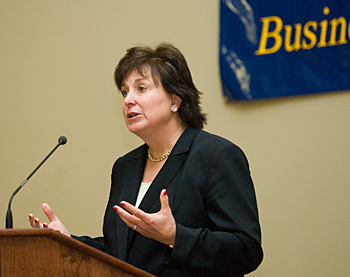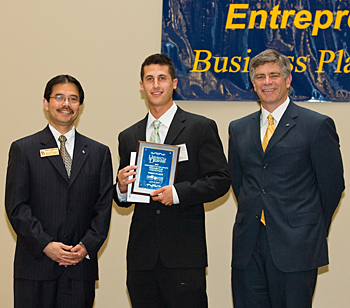
Following an introduction by UD President Patrick Harker, in which he thanked both Ammon and Bobby Gempesaw, dean of UD's Lerner College of Business and Economics, Ammon addressed an audience of more than 150 UD students, faculty, administrators and Delaware entrepreneurs gathered for the all-day conference in the Puglisi Orchestra Hall of the Louise and David Roselle Center for the Arts.
“This is a very important forum, because there is so much going on now to encourage entrepreneurship in Delaware,” Ammon said. “Mostly, I became an entrepreneur because I was very lucky and very naïve.”
Before tracing the history of Endo Pharmaceuticals, Ammon talked about her own history--the reason she became an entrepreneur and how she went about it--and made the point that becoming a successful entrepreneur is partly attitude and partly luck.
“I was ready for a change,” she said, recalling the six-week period in 1996 during which she redefined her career path. “I had been in pain management my whole career, and I saw the value of the products [to manage pain], and passion can sometimes drive you to take crazy risks.”
Ammon outlined the qualities she believes are essential to entrepreneurs--among them hiring great people, creating a respectful workplace environment, recognizing serendipity and checking one's ego--and emphasized that building a sound infrastructure is critical to any successful enterprise.
“The entrepreneur has to leave his or her ego at the doorstep,” she said, “and when serendipity happens, not take credit for it.”
Ammon said that serendipity in the case of Endo Pharmaceuticals involved the as-yet untapped nature of the pain management market in 1996, coupled with the aging population in need of pain relief.
“We didn't have to create the market,” Ammon said. “The Percocet and Percodan franchise, which was the gold standard in pain management, was just handed to Endo. We created a ten-and-a-half- and a seven-milligram tablet, knowing that if we put them on the market, doctors would write prescriptions, and that those prescriptions could not be genericized.”
Ammon said that having the foresight to look ahead and secure a patent-protected product also contributed to Endo's profit spike, adding that the $40 million profit expected from sales turned out instead to be $200 million.
Ammon outlined the similar success of Endo's lidocaine patch before turning her focus to philanthropy, and said that generosity was really just a different configuration of entrepreneurship.
“Philanthropy is really a natural evolution of successful entrepreneurship,” Ammon said, adding that the only major difference was that in the case of a company the focus was on products and in the case of philanthropy the focus was on causes. “Both involve having strong beliefs and taking risks,” she said.

“Successful entrepreneurs want to give back to the community, because they realize that they did not rise to success entirely by themselves,” Ammon said. “As custodians of money, they realize their stake in social responsibility.”
Ammon began her career in 1973 as an associate research scientist at the E.I. duPont de Nemours and Company in Garden City, N.Y., and by 1996 rose to the position of president of U.S. Pharmaceuticals of DuPont Merck Pharmaceuticals Company. In 1997, she led a management buyout team that purchased 37 pharmaceutical products from DuPont Merck to form Endo Pharmaceuticals.
Endo, a specialty pharmaceutical company with market leadership in pain management, became a publicly traded company in July 2000. Based in Chadds Ford, Pa., Endo also has research facilities in Westbury, N.Y. Ammon retired as chairman of the board in 2007.
In 2003, Ammon received the Greater Philadelphia Ernst & Young Entrepreneur of the Year Award in the health sciences category and was named the CEO of the Year in 2004 by the Eastern Technology Council. In 2005, Ammon won the Paradigm Award, the Philadelphia region's most prestigious award for businesswomen, and received the Woman of Spirit Award from the Greater Delaware Valley Chapter of the National Multiple Sclerosis Society.
Now chairperson of the Christiana Health Care System and a member of the Executive Committee of Christiana Care of Delaware, Ammon also is a member of the boards of trustees of Adelphi University, Hagley Museum, and the Delaware Art Museum. She is an adjunct professor in the executive MBA program at the University of Delaware and is a member of Harvard's Health Advisory Board. Additionally, she is a member of the Board of Directors of Pharmacopeia Drug Discovery Inc., in Princeton, N.J.
Ammon's talk was one of several by top entrepreneurs in the tristate area who were invited to speak at the forum. Topics included the importance of nurturing small businesses; the impact of niche marketing and the roles sound business plans and healthy competition play in determining an enterprise's success.
The conference concluded with the announcements of the 2008 Business Plan Competition winners. Senior Zachary Chafitz, a business and economics major from Owings Mills, Md., won the undergraduate competition. Chafitz was coached by Greg Bogart, BE '05. Mehul Patel, a master's-level student in business and economics, and Rohan Hule, a doctoral-level student in engineering, won in the competition's graduate division.
The forum was launched by Harker to examine the role of entrepreneurship in promoting economic growth and development in Delaware.
Article by Becca Hutchinson
Photos by Kevin Quinlan, AS '05

